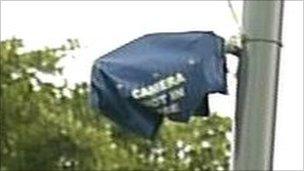Police chief wants Birmingham 'spy' cameras removed
- Published
All surveillance cameras put up in largely Muslim areas of Birmingham should be removed, the chief constable of West Midlands Police has said.
The 200 surveillance cameras, some of which were hidden, were paid for with £3m of government money earmarked for tackling terrorism.
Last month an independent report was highly critical of the scheme.
Chief Constable Chris Sims said he hoped removing the cameras would rebuild trust with communities.
He was speaking at a West Midlands Police Authority meeting responding to the report.
The cameras had been put up in the Washwood Heath and Sparkbrook areas of the city.
All covert cameras have already been removed and the remainder have been covered with bags, but the police chief said they should all now be taken down.
The police have said none of the cameras have ever been switched on, but members of the community have said they were angry about a lack of consultation.
The police authority said at a public meeting on Monday that it is considering five options over the future of the scheme, called Project Champion.
'No way out'
One would see the scheme withdrawn and the cameras left covered, while another would see the withdrawal of the scheme with the cameras taken down.
A third option would see the cameras taken down and a smaller scheme implemented using 35 ANPR and 22 CCTV cameras.
A fourth option would be to deploy the cameras across the city to monitor anti-social behaviour following consultation. The final option would see a smaller scheme run where the cameras currently are and use others across the city.
Mr Sims said he favoured "option two", which is the removal of all cameras.
He said: "I do not see an operational way out… that does not involve removing the scheme and using that as an opportunity to rebuild trust."

The remaining cameras are covered up
The authority is now looking into the costs of their removal.
When asked at the meeting about reacting to an expectation from the public that "heads will roll" over the implementation of the project, Mr Sims said the force was "still in a process of reflection" and that the matter should not be discussed at a public meeting.
He said the level of threat that existed in the city at the time of the project's inception had not evaporated but, the project was not proportional to the threat.
After the meeting, campaigner Steve Jolly called for the chair of the authority, Bishop Derek Webley, to stand down.
Ayoub Khan, Birmingham City Council cabinet member for community safety and local services, said: "It is a matter of regret that West Midlands Police were not transparent in their dealings with Birmingham City Council and that there was not sufficient public consultation before these cameras were put up."
He said he welcomed the plans to remove all the cameras and added: "The way that the Muslim community was targeted is simply unacceptable."
The force commissioned an independent review after angry residents said they had not been consulted about the scheme.
The report said it put relations with the Muslim community back 10 years.
Project Champion involved cameras being put up by the Safer Birmingham Project (SBP), made up of the city council, police and other agencies.
Civil liberties groups have threatened legal action if the force does not agree to remove all the cameras in the next two weeks.
- Published25 October 2010
- Published19 October 2010
- Published30 September 2010
- Published6 August 2010
- Published30 July 2010
- Published17 June 2010